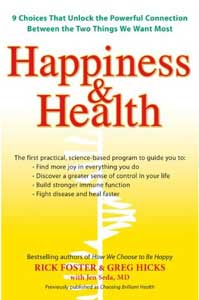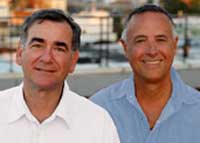 How many times have we said this to ourselves: “If only I could lose 10 pounds, then I would be happy,” or “I can never be truly happy as long as my back continues to hurt.”
How many times have we said this to ourselves: “If only I could lose 10 pounds, then I would be happy,” or “I can never be truly happy as long as my back continues to hurt.”
What it takes to be happy may not be a consequent of losing weight or having a pain-free lumbar spine, but rather, making the choice to be a happy person irrespective of weight or pain may determine just how healthy we can be.
I had the pleasure of interviewing Rick Foster, one of the co-authors of Happiness & Health. Rick and fellow author Greg Hicks discuss their breakthrough research and findings on what it takes to find the two things we covet most in life: Happiness and Health. Rick and Greg are also the authors of the bestselling and international sensation How We Choose to Be Happy.
Continue reading to see the interview.
What was your inspiration for writing Happiness & Health?
 About 12 years ago we started to research happiness. We presented our model, which is the basis of our book How We Choose to Be Happy, to the American Hospital Association to an audience of doctors and medical professionals. Afterward, many of the doctors came up to us and asked to consider how the behaviors of happy people are connected to their healthfulness. Namely, that the model we presented in our book were the behaviors seen in these doctor’s most successful patients.
About 12 years ago we started to research happiness. We presented our model, which is the basis of our book How We Choose to Be Happy, to the American Hospital Association to an audience of doctors and medical professionals. Afterward, many of the doctors came up to us and asked to consider how the behaviors of happy people are connected to their healthfulness. Namely, that the model we presented in our book were the behaviors seen in these doctor’s most successful patients.
So we looked at the research from the Mayo Clinic and we began interviewing and talking to people all over the world, including medical professionals about the connection between happiness and health.
In your book, you debunk the idea that health precedes happiness. Can you talk a bit about the research and findings that led you to develop your theory that happiness actually precedes health?
We looked very closely at the old formula that states if you’re healthy/wealthy/beautiful, you’ll be happy and we found no evidence to support this concept at all. Then recently a large mega study confirmed what we had been observing that if you are happy, you have a far greater chance of being successful, wealthy and healthy.
In all of our work from tribesman in Africa to an East Coaster Lobsterman, we learned that human beings believe that negative emotions generate ill health. It’s the medical community that believes the old formula. We noticed that the things that happy people do actually impact biochemistry. For instance, appreciation causes a blast of oxytocin, improves the strength of the immune system and reduces levels of cortisol.
What is your concept of Brilliant Health?
Brilliant Health is a concept that we came up with to express what it means when you are experiencing a deep sense of vitality. Brilliant Health is also about intellect and using your cognitive skills to develop health and make the decisions and choices that change our biochemistry. Those people who are in a state of Brilliant Health use their higher brain to regulate biochemistry. We are tapping into this concept all the time, whether it’s choosing to eat well or choosing how we treat someone.
 What advice do you have for someone who is overweight and feels like they can never be happy nor healthy until they lose weight?
What advice do you have for someone who is overweight and feels like they can never be happy nor healthy until they lose weight?
I would encourage them to just for one moment, think that perhaps their happiness comes before whether or not they exercise or eat healthy. One thing that extremely happy people do every day is that they set their intentions and they let these intentions guide their behaviors. Setting intentions translates into health by asking yourself what your intentions are before you engage in any behavior whether it’s eating or exercising.
You lay out nine basic choices that we can make for finding happiness and health, but what are five things that we can do every day to be happier and consequently healthier?
First, we need to appreciate. When we are in a state of appreciation, we are in the moment. Secondly, we need to give. We found that people who are healthy and happy, give a lot without expectation of receiving. Giving has also been associated with longevity. We must tell the truth. When we lie, negative effects occur biochemically and these are the same effects that also make us more inclined to overeat. Lastly, we must live out our passions.
How does all of this translate into the changes that we are experiencing now on a global scale?
What we are learning is that what is good for the individual is also good for the world. We are all living by the same rules and we know deep in our hearts what are the right behaviors and choices to make in order to sustain and evolve our species.
Here is the complete review of Happiness & Health.
